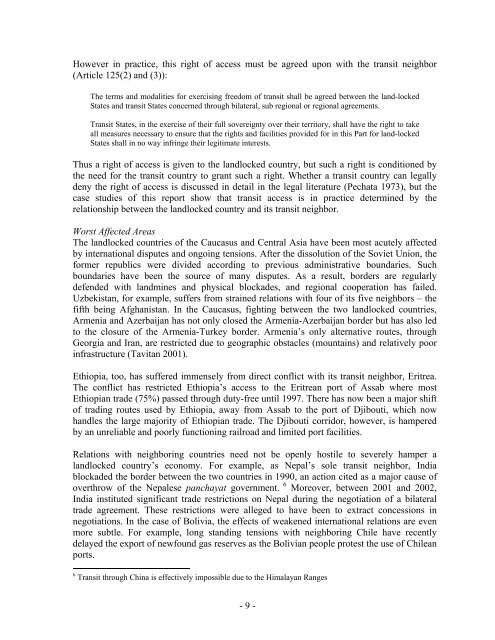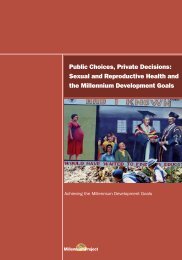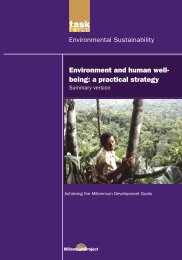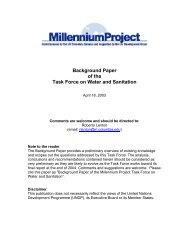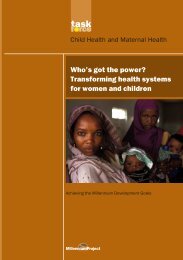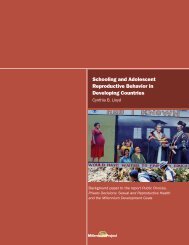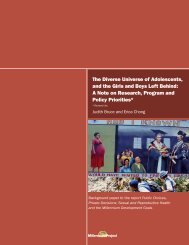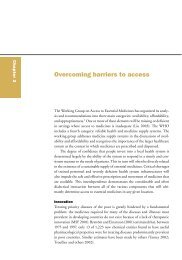the challenges facing landlocked developing countries: a case study ...
the challenges facing landlocked developing countries: a case study ...
the challenges facing landlocked developing countries: a case study ...
You also want an ePaper? Increase the reach of your titles
YUMPU automatically turns print PDFs into web optimized ePapers that Google loves.
However in practice, this right of access must be agreed upon with <strong>the</strong> transit neighbor<br />
(Article 125(2) and (3)):<br />
The terms and modalities for exercising freedom of transit shall be agreed between <strong>the</strong> land-locked<br />
States and transit States concerned through bilateral, sub regional or regional agreements.<br />
Transit States, in <strong>the</strong> exercise of <strong>the</strong>ir full sovereignty over <strong>the</strong>ir territory, shall have <strong>the</strong> right to take<br />
all measures necessary to ensure that <strong>the</strong> rights and facilities provided for in this Part for land-locked<br />
States shall in no way infringe <strong>the</strong>ir legitimate interests.<br />
Thus a right of access is given to <strong>the</strong> <strong>landlocked</strong> country, but such a right is conditioned by<br />
<strong>the</strong> need for <strong>the</strong> transit country to grant such a right. Whe<strong>the</strong>r a transit country can legally<br />
deny <strong>the</strong> right of access is discussed in detail in <strong>the</strong> legal literature (Pechata 1973), but <strong>the</strong><br />
<strong>case</strong> studies of this report show that transit access is in practice determined by <strong>the</strong><br />
relationship between <strong>the</strong> <strong>landlocked</strong> country and its transit neighbor.<br />
Worst Affected Areas<br />
The <strong>landlocked</strong> <strong>countries</strong> of <strong>the</strong> Caucasus and Central Asia have been most acutely affected<br />
by international disputes and ongoing tensions. After <strong>the</strong> dissolution of <strong>the</strong> Soviet Union, <strong>the</strong><br />
former republics were divided according to previous administrative boundaries. Such<br />
boundaries have been <strong>the</strong> source of many disputes. As a result, borders are regularly<br />
defended with landmines and physical blockades, and regional cooperation has failed.<br />
Uzbekistan, for example, suffers from strained relations with four of its five neighbors – <strong>the</strong><br />
fifth being Afghanistan. In <strong>the</strong> Caucasus, fighting between <strong>the</strong> two <strong>landlocked</strong> <strong>countries</strong>,<br />
Armenia and Azerbaijan has not only closed <strong>the</strong> Armenia-Azerbaijan border but has also led<br />
to <strong>the</strong> closure of <strong>the</strong> Armenia-Turkey border. Armenia’s only alternative routes, through<br />
Georgia and Iran, are restricted due to geographic obstacles (mountains) and relatively poor<br />
infrastructure (Tavitan 2001).<br />
Ethiopia, too, has suffered immensely from direct conflict with its transit neighbor, Eritrea.<br />
The conflict has restricted Ethiopia’s access to <strong>the</strong> Eritrean port of Assab where most<br />
Ethiopian trade (75%) passed through duty-free until 1997. There has now been a major shift<br />
of trading routes used by Ethiopia, away from Assab to <strong>the</strong> port of Djibouti, which now<br />
handles <strong>the</strong> large majority of Ethiopian trade. The Djibouti corridor, however, is hampered<br />
by an unreliable and poorly functioning railroad and limited port facilities.<br />
Relations with neighboring <strong>countries</strong> need not be openly hostile to severely hamper a<br />
<strong>landlocked</strong> country’s economy. For example, as Nepal’s sole transit neighbor, India<br />
blockaded <strong>the</strong> border between <strong>the</strong> two <strong>countries</strong> in 1990, an action cited as a major cause of<br />
overthrow of <strong>the</strong> Nepalese panchayat government. 6 Moreover, between 2001 and 2002,<br />
India instituted significant trade restrictions on Nepal during <strong>the</strong> negotiation of a bilateral<br />
trade agreement. These restrictions were alleged to have been to extract concessions in<br />
negotiations. In <strong>the</strong> <strong>case</strong> of Bolivia, <strong>the</strong> effects of weakened international relations are even<br />
more subtle. For example, long standing tensions with neighboring Chile have recently<br />
delayed <strong>the</strong> export of newfound gas reserves as <strong>the</strong> Bolivian people protest <strong>the</strong> use of Chilean<br />
ports.<br />
6 Transit through China is effectively impossible due to <strong>the</strong> Himalayan Ranges<br />
- 9 -


